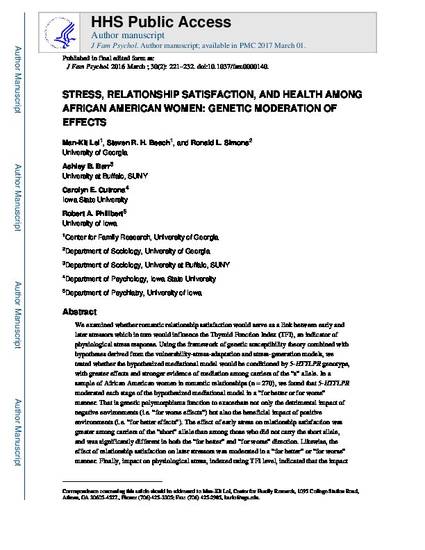
We examined whether romantic relationship satisfaction would serve as a link between early and later stressors which in turn would influence the Thyroid Function Index (TFI), an indicator of physiological stress response. Using the framework of genetic susceptibility theory combined with hypotheses derived from the vulnerability-stress-adaptation and stress-generation models, we tested whether the hypothesized mediational model would be conditioned by 5-HTTLPR genotype, with greater effects and stronger evidence of mediation among carriers of the “s” allele. In a sample of African American women in romantic relationships (n = 270), we found that 5-HTTLPR moderated each stage of the hypothesized mediational model in a “for better or for worse” manner. That is genetic polymorphisms function to exacerbate not only the detrimental impact of negative environments (i.e. “for worse effects”) but also the beneficial impact of positive environments (i.e. “for better effects”). The effect of early stress on relationship satisfaction was greater among carriers of the “short” allele than among those who did not carry the short allele, and was significantly different in both the “for better” and “for worse” direction. Likewise, the effect of relationship satisfaction on later stressors was moderated in a “for better” or “for worse” manner. Finally, impact on physiological stress, indexed using TFI level, indicated that the impact of later stressors on TFI level was greater in the presence of the short allele, and also followed a “for better” or “for worse” pattern. As expected, the proposed mediational model provided a better fit for “s” allele carriers.
Available at: http://works.bepress.com/carolyn_cutrona/26/

©American Psychological Association, 2016. This paper is not the copy of record and may not exactly replicate the authoritative document published in the APA journal. Please do not copy or cite without author's permission. The final article is available, upon publication, at doi: 10.1037/fam0000140.